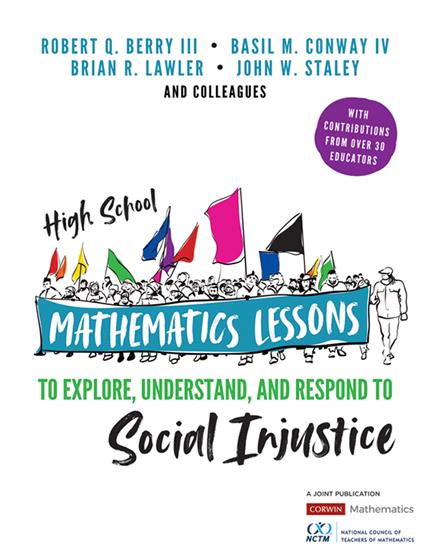Preface by NCTM Past-President Robert Berry and NCSM Past-President John Staley
Introduction
Part I
Chapter 1 Why is Social Justice and Why Does it Matter in Teaching Mathematics
What Do We Mean by Social Justice?
What is Teaching Mathematics for Social Justice
Why Social Justice in Mathematics Education
Reflection and Action
Chapter 2 Getting Ready for Classroom
Context Matters
Context Matters
When Matters
How Matters
Chapter 3 Instructional Tools for the Social Justice Mathematics Lesson
Establishing Goals
Assessign Purposefully
Teaching Equitably
Managing Discourse
Conclusion
Reflection and Action
Chapter 4 Teaching the Social Justice Mathematics Lesson
Social Justice Mathematics Framework
Planning to Implement SJML
Last Words Before You Go Teach
Conclusion
Reflection and action
Part II
Chapter 5 Number and Quantity
5.1 The Mathematics of Transformation Resistance by Mary Candance
5.2 Do Just Some Students Take Honors Course? By Basil Conway
5.3 LISTEN to GLSEN by Bryan Meyer and John W. Staley
5.4 Estimated Wealthy Distribution in USA and the World by Enrique Ortiz
Chapter 6 Algebra and Functions
6.1 Children at the Border: Looking at the Numbers by Samantha Fletcher and Holly Anthony
6.2 Climate Change in Alaska by Basil Conway IV
6.3 Culturally Relevant Income Inequality by Andrew Reardon
6.4 Intersectionality and The Wage Gap by Stacy Jones, Carlos Gomez, HIlary Tanck, and Eric Siy
6.5 Literacy: What matters and why? By Frances Harper and Stephanie Orr
6.6 What's a Fair Living Wage? By Frances Harper
6.7 What's the Cost of Glbalization? By Allyson Hallman-Thrasher and Rachel Eriksen Brown
Chapter 7 Statistics and Probability
7.1 A False Positive by Bryan Meyer
7.2 Are you a Citizen? 2020 Census by Travis Weiland and Lisa Poling
7.3 "BBQ, Becky," Policing, and racial Justice by Mary Raygoza
7.4 Do Postal Codes Predict Test Scores? by Allyson Lam
7.5 Humanizing the Immigration Debate by Aysenur Ozturk and Steve Lewis
7.6 Prison Population by Cristina Tyris
7.7 Sampling Disaster by Ginny Powell and America Powell
Chapter 8 Geometry
8.1 Bringing Healthy Food Choices to Desert by Shakiyya Bland
8.2 Gerrymandering by Sven A. Carlsson
8.3 Making Mathematical Sense of Food Justice by Jessica Davidson, Dr. Steven Greenstein, Debasmita Bas, and Julia Davidson
8.4 Paralympics by Eric Siy, Stacy R. Jones, Carlos, Nicholas Gomez, and HIlary Tanck
Part III
Chatper 9 Voices from the Field
Success Implementing SJMLs
Planning for and Responding to Challenges
Additional Advice to Colleagues Implementing SJMLs
Conclusion
Closing Thoughts from Our Contributors
Chapter 10 Creating Social Justice Mathematics Lessons for your Own Classroom
Setting a Framework for an Effective SJML
Getting Started
Final Words
Appendix A Recommended readings & resources
Appendix B Resources names in lessons
Appendix C Mathematical Essential Concepts
Appendix D Social Justice Standards & Topics
Appendix E Lessons by Math Content, Social Justice Outcomes, and Social Justice Topics
Appendix F SJML Planner





